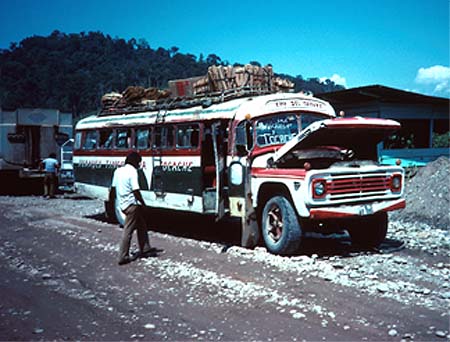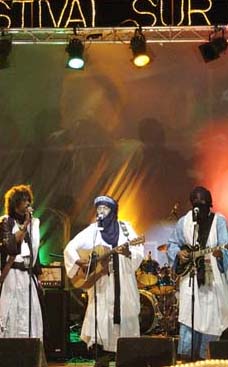2002.07.01: July 1, 2002: Headlines: Safety: COS - Peru: Humor: American Water Works Association Journal : Update: Jack Hoffbuhr remembers Safety and Security in Peru during his service as a Peace Corps Volunteer in Peru in the 1960's
Peace Corps Online:
Peace Corps News:
Headlines:
Peace Corps Headlines - 2002:
07 July 2002 Peace Corps Headlines:
July 1, 2002 - American Water Works Association Journal : Peru RPCV Jack Hoffbuhr remembers Safety and Security of Andean Buses :
2002.07.01: July 1, 2002: Headlines: Safety: COS - Peru: Humor: American Water Works Association Journal : Update: Jack Hoffbuhr remembers Safety and Security in Peru during his service as a Peace Corps Volunteer in Peru in the 1960's
Update: Jack Hoffbuhr remembers Safety and Security in Peru during his service as a Peace Corps Volunteer in Peru in the 1960's

"It was during my Peace Corps days high in the Peruvian Andes. My partner and I were working in the very small villages of that area building water systems, roads, and schools. It just so happened that Che Guevara's minions were also in the same area recruiting and taking anything that wasn't nailed down. But because we pretty much looked and smelled like everyone else, they left us alone. The only transportation to a real town, where one could find hot water, cold beer, and something to eat besides guinea pigs, was a combination bus and truck called a mixto. People went up front, and pigs and chickens were in the rear. When our financial resources were thin, we joined the livestock.
Update: Jack Hoffbuhr remembers Safety and Security in Peru during his service as a Peace Corps Volunteer in Peru in the 1960's
The three C's
Jul 1, 2002 - American Water Works Association. Journal
Author(s): Hoffbuhr, Jack W
water scape
AN EXECUTIVE PERSPECTIVE
AS I WAS PERUSING THE NEW PUBLIC HEALTH SECURITY AND BIOTERRORISM PREPAREDNESS AND RESPONSE ACT, I RECALLED MY FIRST BRUSH WITH THE INTRICACIES OF SECURITY.
It was during my Peace Corps days high in the Peruvian Andes. My partner and I were working in the very small villages of that area building water systems, roads, and schools. It just so happened that Che Guevara's minions were also in the same area recruiting and taking anything that wasn't nailed down. But because we pretty much looked and smelled like everyone else, they left us alone.
The only transportation to a real town, where one could find hot water, cold beer, and something to eat besides guinea pigs, was a combination bus and truck called a mixto. People went up front, and pigs and chickens were in the rear. When our financial resources were thin, we joined the livestock.

Che's bunch didn't bother the Andes Express unless they thought there was liquor on board or they needed a pig to round out their dinner menu. But that was before the Peruvian government got the bright idea to put soldiers on the mixtos to guard such priceless cargo. Of course, Che's troops thought it was great sport to shoot at the soldiers. Neither side could hit the broad side of a barn, but there were a lot of bullets rattling around and through the mixtos. After a few civilians were hit and more than one pig was killed, the government pulled the soldiers, and the shooting stopped. The major lesson I learned from that fiasco is that security is far more complex than posting a few armed guards here and there.
In fact, my major concern is that we get consumed by the complex nature of security and its attendant technology and forget some very basic principles. To me, these principles are the three C's- culture, coordination, and communication. If the three C's are not embedded in an organization's security philosophy, no amount of investment in fences, remote sensors, cameras, or armed guards will result in an effective security program.
The culture of an organization is the set of customary beliefs and core values that define its mission and what it considers important. Security must become a part of this culture along with public health protection and customer service. Each employee must become as tenacious about security as he or she is about water quality and safety. Security must be a part of everyone's responsibilities-not just the general manager's or security director's. If it is not, security will never be considered important, and no amount of technology will change that attitude.
Close coordination is critical in any type of emergency event, and the time to start is now. The true path to disaster is the attitude that there is no time to foster coordination with key groups such as local law enforcement agencies, fire departments, electrical utilities, and emergency planning offices. They can provide resources to enhance your security and emergency response plans but only if they are involved from the beginning.
"Communication was the fatal flaw"-this has been the most common statement after any emergency event. We know that our day-to-day routine communications are essential for coordination and to maintain credibility. Crisis communication is less well understood but even more critical once an event occurs because the first few hours are characterized by maximum chaos and minimum information. Now is the time to develop a crisis communication plan and practice it to identify problems. Too many plans gather dust-they will be the fatal flaw.
Machiavelli wrote in The Prince, "Only those means of security are good, are certain, are lasting that depend on yourself and your own vigor." Armed guards, sensors, and controlled access systems are only tools in any security scheme. The truly effective security plan will depend on people and the vigor they apply to culture, coordination, and communication.
NOW IS THE TIME TO DEVELOP A CRISIS COMMUNICATION PLAN AND PRACTICE IT TO IDENTIFY PROBLEMS.
Copyright American Water Works Association Jul 200
Links to Related Topics (Tags):
Headlines: July, 2002; Safety and Security of Volunteers; Peace Corps Peru; Directory of Peru RPCVs; Messages and Announcements for Peru RPCVs; Humor
When this story was posted in April 2007, this was on the front page of PCOL:





Peace Corps Online The Independent News Forum serving Returned Peace Corps Volunteers
 | Chris Dodd's Vision for the Peace Corps
Senator Chris Dodd (RPCV Dominican Republic) spoke at the ceremony for this year's Shriver Award and elaborated on issues he raised at Ron Tschetter's hearings. Dodd plans to introduce legislation that may include: setting aside a portion of Peace Corps' budget as seed money for demonstration projects and third goal activities (after adjusting the annual budget upward to accommodate the added expense), more volunteer input into Peace Corps operations, removing medical, healthcare and tax impediments that discourage older volunteers, providing more transparency in the medical screening and appeals process, a more comprehensive health safety net for recently-returned volunteers, and authorizing volunteers to accept, under certain circumstances, private donations to support their development projects. He plans to circulate draft legislation for review to members of the Peace Corps community and welcomes RPCV comments. |
 | He served with honor
One year ago, Staff Sgt. Robert J. Paul (RPCV Kenya) carried on an ongoing dialog on this website on the military and the peace corps and his role as a member of a Civil Affairs Team in Iraq and Afghanistan. We have just received a report that Sargeant Paul has been killed by a car bomb in Kabul. Words cannot express our feeling of loss for this tremendous injury to the entire RPCV community. Most of us didn't know him personally but we knew him from his words. Our thoughts go out to his family and friends. He was one of ours and he served with honor. |
 | Peace Corps' Screening and Medical Clearance
The purpose of Peace Corps' screening and medical clearance process is to ensure safe accommodation for applicants and minimize undue risk exposure for volunteers to allow PCVS to complete their service without compromising their entry health status. To further these goals, PCOL has obtained a copy of the Peace Corps Screening Guidelines Manual through the Freedom of Information Act (FOIA) and has posted it in the "Peace Corps Library." Applicants and Medical Professionals (especially those who have already served as volunteers) are urged to review the guidelines and leave their comments and suggestions. Then read the story of one RPCV's journey through medical screening and his suggestions for changes to the process. |
 | The Peace Corps is "fashionable" again
The LA Times says that "the Peace Corps is booming again and "It's hard to know exactly what's behind the resurgence." PCOL Comment: Since the founding of the Peace Corps 45 years ago, Americans have answered Kennedy's call: "Ask not what your country can do for you--ask what you can do for your country. My fellow citizens of the world: ask not what America will do for you, but what together we can do for the freedom of man." Over 182,000 have served. Another 200,000 have applied and been unable to serve because of lack of Congressional funding. The Peace Corps has never gone out of fashion. It's Congress that hasn't been keeping pace. |
 | PCOL readership increases 100%
Monthly readership on "Peace Corps Online" has increased in the past twelve months to 350,000 visitors - over eleven thousand every day - a 100% increase since this time last year. Thanks again, RPCVs and Friends of the Peace Corps, for making PCOL your source of information for the Peace Corps community. And thanks for supporting the Peace Corps Library and History of the Peace Corps. Stay tuned, the best is yet to come. |
 | History of the Peace Corps
PCOL is proud to announce that Phase One of the "History of the Peace Corps" is now available online. This installment includes over 5,000 pages of primary source documents from the archives of the Peace Corps including every issue of "Peace Corps News," "Peace Corps Times," "Peace Corps Volunteer," "Action Update," and every annual report of the Peace Corps to Congress since 1961. "Ask Not" is an ongoing project. Read how you can help. |
Read the stories and leave your comments.

Some postings on Peace Corps Online are provided to the individual members of this group without permission of the copyright owner for the non-profit purposes of criticism, comment, education, scholarship, and research under the "Fair Use" provisions of U.S. Government copyright laws and they may not be distributed further without permission of the copyright owner. Peace Corps Online does not vouch for the accuracy of the content of the postings, which is the sole responsibility of the copyright holder.
Story Source: American Water Works Association Journal
This story has been posted in the following forums: : Headlines; Safety; COS - Peru; Humor
PCOL37282
63


















